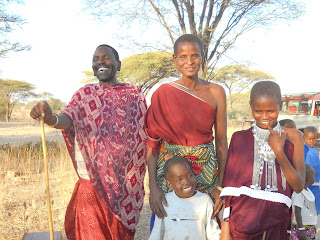Why are they laughing?
This is Joshua and Rose Kuyaa and family. This picture is on the cover of the worship bulletin for World Mission Weekend.
Joshua is an evangelist in Tungamalenga Parish -- a lay person who leads worship and does pastoral care in his village congregation. In Tungamalenga Parish, there are two pastors for twenty village congregations. The evangelists in each congregation give leadership and care to the congregation in between visits by the pastors, who might be present every couple months.
So why are Joshua, Rose and their children laughing? The photo was taken in August 2012 when I visited their village, Namelok. I had asked them to assemble and took a family photo with all of them looking very serious. Then I explained that I wanted the photo for the children's camp we were going to hold later in the month.
The children's camp would help Shepherd of the Valley children experience a slice of Tanzanian life. Children would be divided into Tanzanian families, small groups of six kids with a leader who had been to Tanzania. We had the Kahwage family, the Kilipamwambu family, the Kuyaa family, and the Massinga family. Two families represented the Hehe culture, and two families the Maasai.
So I'm explaining to Joshua how the children would wear Maasai or Hehe clothing, they would learn some Swahili, some Hehe and some Maasai greetings, they would try the food, they would have typical chores like carrying water or collecting firewood. And in all of this, they would learn about our partnership.
So why are Joshua and Rose laughing?
I don't know for sure, but I can guess. First off, Joshua is Maasai and so there's no false humility here. Maasai people are proud of their culture and their heritage. They are probably very proud that their culture would be subject for sharing within our congregational partnership.
Second, the people of Tungamalenga meet a lot of Americans who are on their way to the adjacent national park. Most of those Americans are not interested in partnership, or in the conditions of life in Tanzania. Most of those Americans are in Tanzania to see the animals at Ruaha. Most of those Americans expect their lodging to be on a par with the Best Western hotels at home, and are annoyed by limited electricity or substandard plumbing. If those Americans experience any local culture at all, it's because the lodge where they are staying pays a few Maasai locals to come dance for them. In comparison to the Maasai singing and dancing we've had the privilege of experiencing on our village visits, the lodge presentations seem to be a caricature of local customs, exaggerated for the paying visitors.
So Joshua does not expect Americans to be sincerely interested in his culture, in his daily life, in his family's struggles. When he hears me say our Minnesota children will be carrying water and wearing Tanzanian clothing, he laughs.
I don't think it's a laugh of derision. I think it's a laugh of surprise. Who are these Americans that we're partnered with, who want to experience a little of our lives? Maybe it's a laugh that says, oh, these Americans, just when you think you've got them figured out, they throw another wrinkle into the mix. And it's a laugh of acceptance -- those Americans, we may not understand them, but we do appreciate their partnership.




Comments
Post a Comment